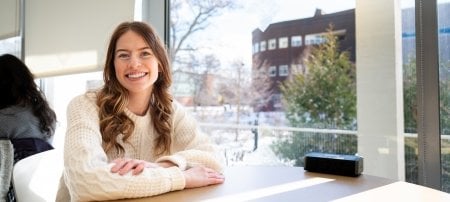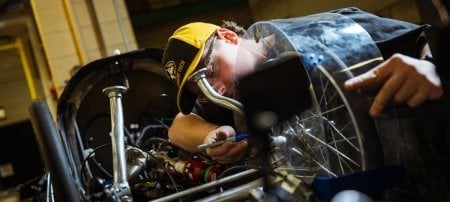Running Ultramarathons in the Kalahari: Tech Student Says Why Not?

For most of us, running a marathon is a dream, somewhere between being a rock star and an all-star slugger. But for environmental engineering student Breanna Cornell, a marathon didn't seem to be quite enough of a challenge.
After watching the ultramarathon documentary "Running the Sahara" in her local running store, Cornell, whose goal was to run a marathon after high school, realized that a marathon was not the limit of what was possible.
"I asked myself, why did I put a limit at just a marathon?" the environmental engineering major said.
"You're crazy," was her friend's incredulous comment. "I know," Cornell replied with a smile.
Eager to train for distances beyond 26.2 miles the right way, Cornell got in touch with Ray Zahab, one of the runners starring in "Running the Sahara." Rather than just offering her some tips, Zahab invited Cornell to join his new venture, impossible2Possible (i2P).
Cornell will be one of eight youth ambassadors for i2P's Expedition Africa 2012, highlighting water issues in Botswana's Kalahari Desert. The ambassadors will alternate between running ultramarathons, studying water issues, and sharing their experiences—of both running and life in the desert—with students around the world. The entire i2P expedition will cross 400 kilometers (248.5 miles)of the Kalahari in Botswana; Cornell will travel 200 kilometers.
When asked if running 50 kilometers (about 31.1 miles) per day for four days straight was intimidating, Cornell didn't hesitate.
"Oh, not at all," she said, with a small shrug. "Before the school year I ran from my home in Grand Rapids to the Mackinac Bridge as a fundraiser for Tech's Rowing Club."
Cornell stressed that water is the important issue for the i2P expedition. "Water is something we really take for granted, especially in Michigan," she said. "The running is just the fun part."
Indeed, the focus of the expedition is on water quality issues, with running as a metaphor for overcoming seemingly impossible challenges. With so much of the world's population without access to safe, reliable sources of drinking water, i2P has partnered with Simon Fraser University in Vancouver, British Columbia, to draw attention to the looming crisis.
Cornell has been preparing herself for this expedition, both with her physical training and her studies, and she's ready to make what to most of us seems impossible, possible. There is one chance the expedition won't be taking, however.
"There's a park we have to drive through, rather than running across it," she said with a hesitant smile. The reason? "Apparently the lions will eat you."
Follow Breanna Cornell and her fellow youth ambassadors on their journey Oct. 29 through Nov. 12 at impossible2Possible.
Michigan Technological University is a public research university founded in 1885 in Houghton, Michigan, and is home to more than 7,000 students from 55 countries around the world. Consistently ranked among the best universities in the country for return on investment, Michigan’s flagship technological university offers more than 120 undergraduate and graduate degree programs in science and technology, engineering, computing, forestry, business and economics, health professions, humanities, mathematics, social sciences, and the arts. The rural campus is situated just miles from Lake Superior in Michigan's Upper Peninsula, offering year-round opportunities for outdoor adventure.




Comments